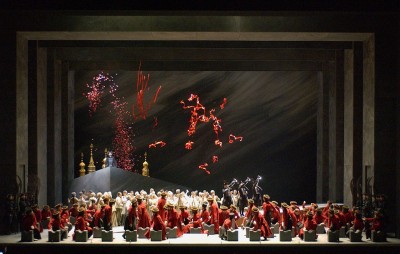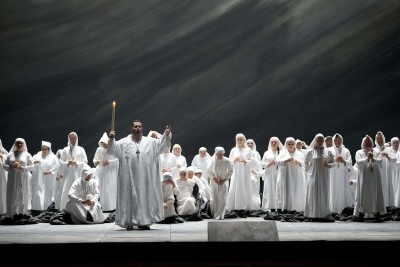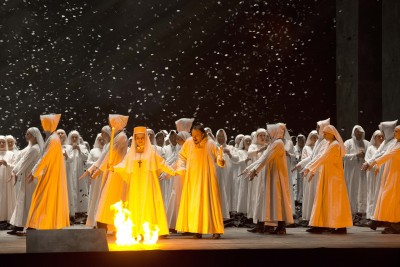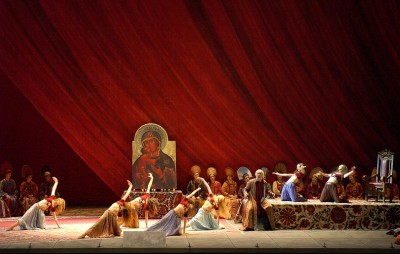Magnificent La Khovantchina at Bastille
PARIS: Modest Mussorgskys magnifique La Khovantchina is back on the Opera de Bastille in Paris, repremiere was 22. January 2013. It will be performed with 7 performances from 22 January to 9 February 2013 at Opéra Bastille.
Review by Henning Høholt, fotos Ian Patrick, and Ch. Leiber, Opera de Paris.
It is a great production, wonderful to enjoy with an outstanding cast, headed by Larissa Diadkova as Marfa, Orlin Anastassov as Dorifei, Vladimir Galouzine as Prince Andrei Khovanski, Gleb Nikolsky as Prince Ivan Khovanski and Vseviolod Grivnov as Prince Vassili Golitsine. Furthermore we enjoyed Marina Lapina as Susanna, Vadim Zaplechny as the Clerc, Natalia Tymchenko as Emma, Yuri Kissin as Varsonofiev, Vasily Efimov as Kouzka, Vladimir Kapshuk as Strechniev. The musical direction was in the very best hands by the conductor Michail Jurowski.
Khovanshchina (Russian: Хованщина, Hovánščina, is an opera (subtitled a ‘national music drama’) in five acts by Modest Mussorgsky. The work was written between 1872 and 1880 in St. Petersburg, Russia. The composer wrote the libretto based on historical sources
. The opera was unfinished and unperformed when the composer died in 1881. On Mussorgskys death, with the exception of of the end of Act 2 and the final scene of Act 5, the vocal score was almost complete. However only two fragments of Act 3 had been orchestrated. In order for the work to be performed, it needed the aid of other musicians.
The composer Nikolai Rimsky-Korsakov, that Modest Mussorgsky a periode lived together with in St. Petersburg, completed, revised, and scored Khovanshchina in 1881–1882. Because of his extensive cuts and “recomposition”, Dmitri Shostakovich revised the opera in 1959 based on Mussorgsky’s vocal score, and it is the Shostakovich version that is usually performed, and also is the version performed in Paris.
However, other composers has also been trying to reproduce Khovantchina. In 1913 Igor Stravinsky and Maurice Ravel made their own arrangement at Sergei Diaghilev´s request. When Feodor Chaliapin refused to sing the part of Dosifei in any other orchestration than Rimsky-Korsakov‘s, Diaghilev’s company employed a mixture of orchestrations which did not prove successful. The Stravinsky-Ravel orchestration was forgotten, except for Stravinsky‘s finale, which is still used.
After Boris Godunov, Khovanshchina was intended to be the second part in a triologie of historical operas based on this historical theme. As Mussorgsky died, the third opera was never started, and it is neither clear, as far to my knowledge, if Mussorgsky had any plans for the name.
Like Mussorgsky‘s earlier Boris Godunov, Khovantchina deals with an interesting episode in Russian history, which first was brought to the composer’s attention by his friend Vladimir Stasov. It concerns the rebellion of Prince Ivan Khovansky (known as the White Swan), in this Paris production splendid performed by Gleb Nikolsky, the Old Believers, in this production leaded by Orlin Anastassov as Dorifei, and the Streltsy, against Tsar Peter the Great, who was attempting to institute Westernizing reforms to Russia. Peter succeeded, the rebellion was crushed and (in the opera, at least) Khovansky’s followers committed mass suicide.
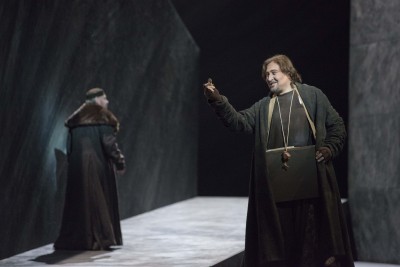
Sergey Murzaev (Chakloviti en arrière-plan) et Vadim Zaplechny (Le Clerc), two other beautiful voices in this production, foto Ian Patrick
- Larissa Diadkova (Marfa), Vladimir Galouzine (Prince Andrei Khovanski) et les Choeurs de l’Opéra national de Paris, foto Ian Patrick
I like the staging by Andrei Serban, he is well forming the different characters in the story.
Richard Hudson gave the atmosphaere through his beautiful costumes and scenography. Yves Bernard is delivering very effective and beautiful light. For the large groupes, to get them to move elegantly and for the dancing parts Laurence Fanon has given good choreography.
Alessandro di Stefano is responsable for the demanding choire parts, which was shining in the sound, brilliant. For me it is importent that the stage director not have tryed to modernise the idea, as this work, with its historical links to 1600 Russia, would have been spoiled completely by a renewing in that way.
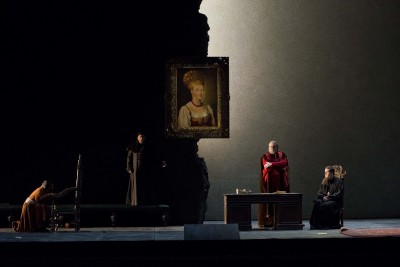
Yuri Kissin (Varsonofiev), Sergey Murzaev (Chakloviti), Gleb Nikolsky (Prince Ivan Khovanski) et Orlin Anastassov (Dosifei), foto Ian Patrick
The old time is well prepared, and the beautiful, and even some times amazing costumes by Richard Hudson for some of the leading roles, and the scenographic effects gives the right atmosphaere for the piece. Inclusive the contrast between the Old time, and the new French inspiration, presented by Prince Vassili Golitsine, sung and performed well by Vsevolod Grivnov – who is making a good caricature of a spoiled French noble man. This persons attitude is followed good up in the costumes.
However, I found it a bit too much fairytale in the end with the white and black changes, it looked like, the costume and scenographi has got empty for ideas, or didnt have time to find out of some thing else.
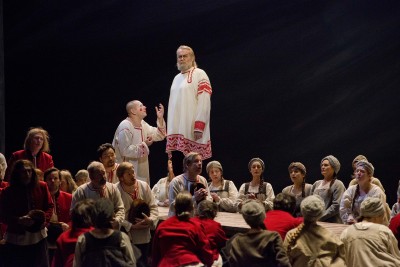
Vasily Efimov (Kouzka), Gleb Nikolsky (Prince Ivan Khovanski) et les Choeurs de l’Opéra national de Paris, foto Ian Patrick
The history is complicated to understand, not as easy as Boris Godunov. Unlike in Boris Godunov there is no principal character in the work, just elements making up a larger rableau. Similarly, the people do not constitute a single bloc, but are subdivided into numerous groups (Streltsy, Old Believers, the Muscovite mob, etc.)
Nevertheless, like Boris, Khovantchina portrays a key moment in Russia´s past in which personal tragedy is inseparably interwined with historical events.
– It could have been interesting if Mussorgsky has managed also to write and compose a third opera in the planned triologi.
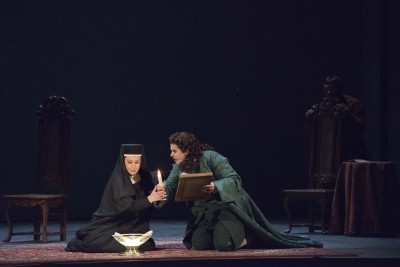
Larissa Diadkova (Marfa), Vsevolod Grivnov (Prince Vassili Golitsine) et Yuri Kissin (Varsonofiev), fot Ian Patrick
– But as usual. Opera de Paris has edited a very good printed program with necessary background information needed, and this information is in French, German and English. This helps a lot, but would be best if read in advance
. Furthermore illustrations, articles and libretto in
This production of La Khovantchina is a coproduction with Teatro del Maggio Musicale Fiorentino in Firenze.


